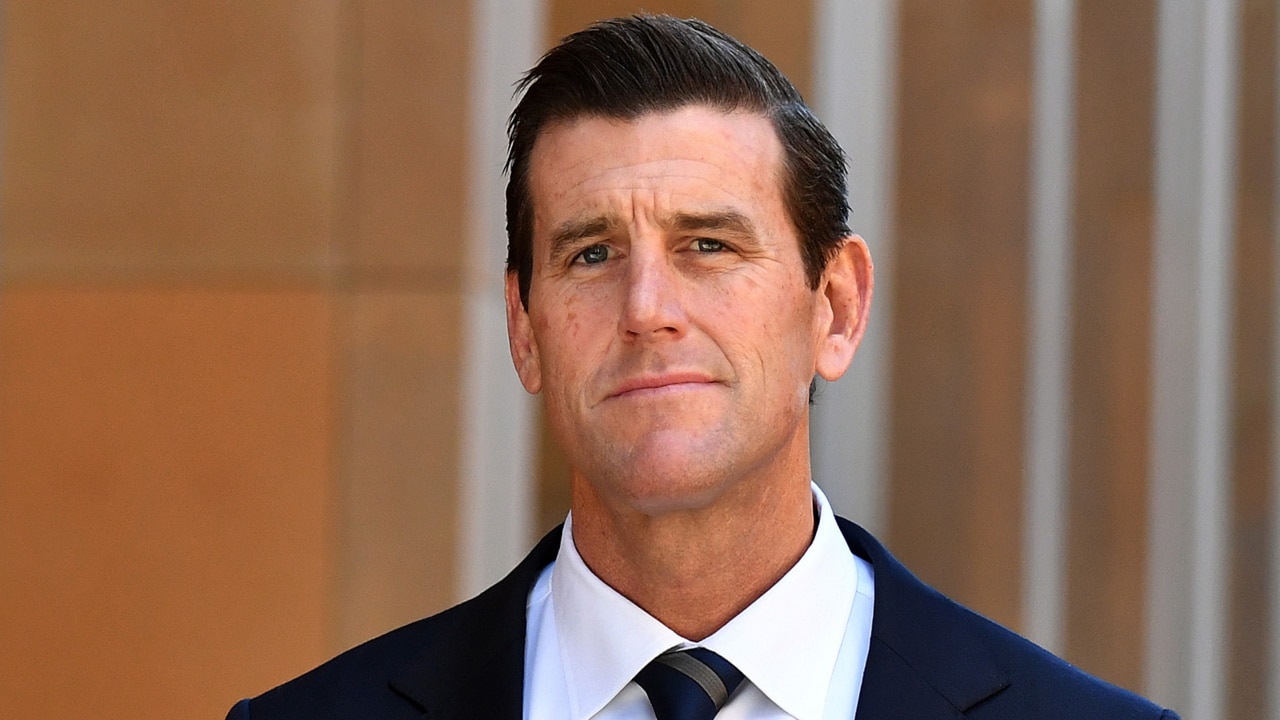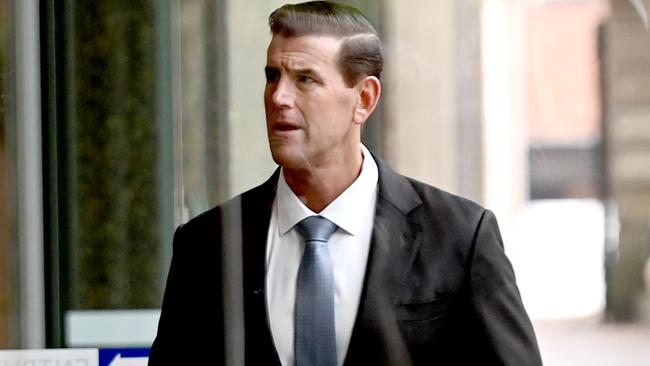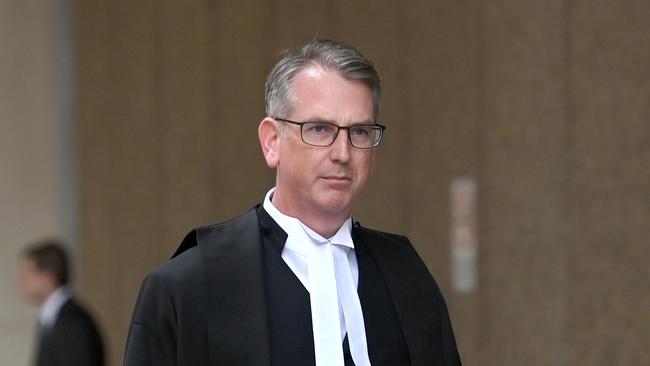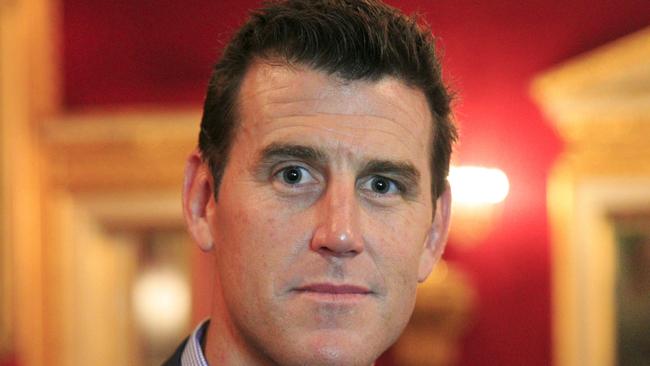Ben Roberts-Smith’s court fight over cliff-kick allegation
Nine’s lawyers argue that findings that Ben Roberts-Smith kicked an Afghan villager down a cliff shouldn’t be overturned.

Allegations that Ben Roberts-Smith kicked a handcuffed Afghan villager down a cliff before he was shot and killed are backed up by three witnesses and shouldn’t be overturned, Nine’s lawyers have told a court.
Mr Roberts-Smith, Australia’s most decorated living soldier, appealed to the Full Court of the Federal Court in an effort to clear his name following his damaging defamation loss to Nine Newspapers last year.
Justice Anthony Besanko last year dismissed a lawsuit brought by Mr Roberts-Smith over a series of articles in the Sydney Morning Herald, The Age and Canberra Times relating to his deployment in Afghanistan.
In his judgment, Justice Besanko found that Mr Roberts-Smith, 45, had been involved in the unlawful killings of four prisoners in Afghanistan - allegations which continue to be disputed by the Victoria Cross recipient.
He has appealed to the Full Court of the Federal Court and is facing a two-week hearing before Justices Nye Perram, Anna Katzmann and Geoffrey Kennett.

His lawyers have argued that Justice Besanko made a number of incorrect findings, including that took part in the murder of a handcuffed shepherd, Ali Jan, at Darwan in September 2012.
In their notice of appeal, Mr Roberts-Smith’s lawyers have argued that Justice Besanko erred in finding that he kicked Ali Jan off a cliff and that he made an agreement with another soldier, Person 11, that the villager should be shot.
Nine newspapers at trial relied on three Afghan villagers witnesses who gave evidence via videolink from their home country.
In his findings, handed down last June, Justice Besanko said that Ali Jan, who was handcuffed, was taken to a small cliff or steep slope, was held Person 11 before Mr Roberts-Smith stepped back and kicked him into a dry creek bed below.
He also found that Mr Roberts-Smith and Person 11 conferred before Person 11 shot Mr Jan.
“The applicant falsely reported that Ali Jan was a spotter who had been engaged in the cornfield,” Justice Besanko said in his 2600-paragraph judgment.
Mr Roberts-Smith’s lawyers at trial argued that one of the witnesses to the event, another soldier, known as Person 4, was not reliable.
And in their Notice of Appeal, they argued that Justice Besanko placed undue weight on the Afghan witnesses to corroborate Person 4’s version, when they were not reliable.
They have also pointed to what they described as discrepancies between the evidence given by the Afghan villagers, and Person 4, in particular about the number of people who were in the compound.
However, in his submissions to the court on Thursday, Nine’s barrister, Nicholas Owens SC submitted that the Afghan witnesses, and Person 4, gave consistent accounts.

“In terms of the kick itself, we emphasise there is corroborating evidence from Person 4 on the one hand and two of the Afghan witnesses, Mohammed Hanifa and Shahzada (Fatih),” Mr Owens said.
“They all give fundamentally consistent accounts of Ali Jan being kicked off the cliff.
“Unsurprisingly, Person 4, as an additional detail relating to Australian personnel that the Afghan witnesses don’t, which is Person 11 and his role in the kick.”
Mr Owens argued that while one of the Afghan villagers, Mohammed Hanifa, did not give evidence about Person 11 being in the vicinity when Mr Jan was kicked, he said that was “unsurprising” given he was scared and had his head down at the time.

“Likewise, Shahzada’s evidence, there was a suggestion he didn’t have a clear line of sight, but we say that’s wrong,” Mr Owens said.
“We can see from the photographs that he would have, we had a gap through trees that he could see, it was only about 100 odd metres.”
Mr Owens added: “We say those three accounts, in particular the coherence of Person 4 on the one hand, and the Afghan villagers on the other, is a highly probative matter.”
Mr Roberts-Smith’s barristers have attempted to discredit Person 4’s evidence, including pointing to his recollection of the timing of events at the compound.
Justice Besanko also took into account Person 4’s mental health issues, which the court heard affected some aspects of his memory.
However Justice Besanko also noted in his judgment: “I did not detect anything in (Person 4’s) ability to comprehend the questions he was asked and the answers he gave or any suggestion that his mental health issues, including the medications he was taking, affected his ability to recount the substance of what he saw.”
Justice Besanko also said he found Person 4 did not attempt to give “deliberately false evidence”.
Mr Owens argued that Justice Besanko conducted a “very careful analysis of Person 4”.
“There cannot said to be error in the way the trial judge has considered Person 4’s evidence,” Mr Owens said.
“He has taken into account matters adverse to the reliability of Person 4, he has considered how Person 4 is strongly corroborated by Person 56 … and by the Afghan witnesses, with whom there can be no suggestion of contamination or collusion.
“At the end of the day the conclusion his honour has drawn, cannot be said to be affected by error.”
The two-week hearing continues on Thursday.



